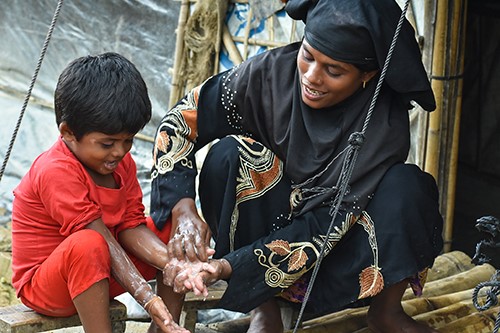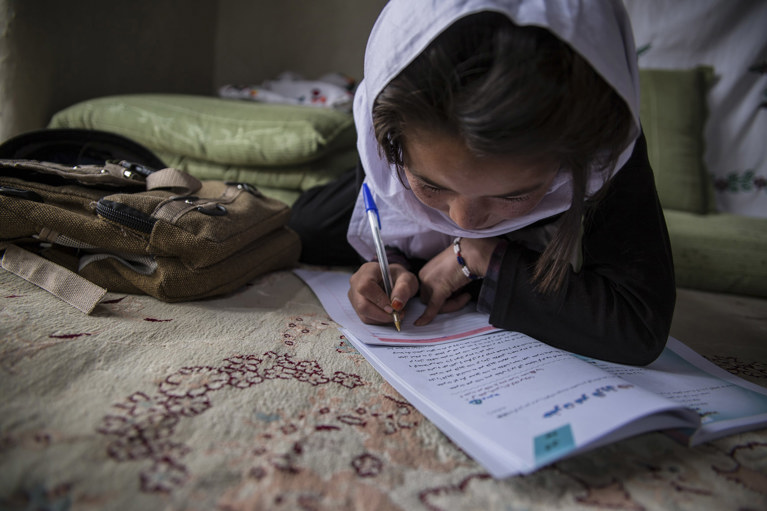World Refugee Day: a record 100 million people now forcibly displaced
20 Jun 22
The number of displaced people worldwide has surpassed 100 million for the first time, propelled by the war in Ukraine and other conflicts across the world.
The ongoing war in Ukraine has led to the fastest-growing refugee crisis since the end of World War II. More than 14 million people have fled their homes since February 24th, with at least 6 million civilians, mostly women and children, seeking refuge in neighbouring countries.
In 2021, conflict and violence triggered 14.4 million internal displacements, a nearly 50 per cent increase on the previous year. Natural disasters such as floods and cyclones resulted in 23.7 million internal displacements, mainly in the Asia-Pacific region.
Global refugee statistics at a glance
35 million refugees
are children, with more than 1 million children born as refugees
85% of refugees
are hosted in developing countries that are already struggling with high rates of poverty.
68% of refugees
come from just five countries alone – Syria, Venezuela, Afghanistan, South Sudan and Myanmar.
On World Refugee Day (June 20), we recognise the resilience of the millions of displaced people around the world as they strive to rebuild their lives. With your generous support, we are working with refugees in some of the most vulnerable communities in the world to access clean water, food and education.
Supporting Rohingya refugees in Cox’s Bazar
The Rohingya people have faced systematic persecution in Myanmar for decades. The latest wave of violence in 2017 forced a massive influx of Rohingya refugees from the Rakhine state to Bangladesh.
An estimated 745,000 Rohingya people —including more than 400,000 children—have now fled into Cox’s Bazar, the largest refugee camp in the world. They continue to live in highly challenging circumstances and are extremely vulnerable to disasters such as monsoons and flooding.
Our partner Caritas Bangladesh is working with the CAN DO network to support Rohingya refugees in Cox's Bazar.
The program has supported approximately 70,000 Rohingya refugees through a number of initiatives including:

Training local volunteers about COVID-19 and hygiene practices
Repair and maintenance of 722 latrines, including constructing accessible latrines for people with a disability
Establishing and supporting women producer groups to help women earn an income
Running disaster community awareness sessions such as early warnings, preserving dry food and water, and evacuation plans during cyclones and landslides
Along with your generous support, this program is supported by the Australian Government, through the Australian Humanitarian Partnership (AHP).
Displaced people in Afghanistan facing a dire humanitarian crisis
After decades of unrest and drought, the situation in Afghanistan has become one of the world’s worst humanitarian crises, with economic collapse, long-term drought and a brutal winter leaving millions in need of urgent humanitarian assistance.
Thousands of families, especially women and girls, who face disproportionate risks to their health, safety and wellbeing, are fleeing their homes. An estimated 3.5 million people are internally displaced within the country, according to the UNHCR.
Unless urgent action is taken, it is estimated that 97 percent of Afghanistan’s population will be pushed into extreme poverty by the end of June.
CRS, our partner in Afghanistan, is currently responding to the crisis, by providing:

Displaced people in Afghanistan facing a dire humanitarian crisis
After decades of unrest and drought, the situation in Afghanistan has become one of the world’s worst humanitarian crises, with economic collapse, long-term drought and a brutal winter leaving millions in need of urgent humanitarian assistance.
Thousands of families, especially women and girls, who face disproportionate risks to their health, safety and wellbeing, are fleeing their homes. An estimated 3.5 million people are internally displaced within the country, according to the UNHCR.
Unless urgent action is taken, it is estimated that 97 percent of Afghanistan’s population will be pushed into extreme poverty by the end of June.
CRS, our partner in Afghanistan, is currently responding to the crisis, by providing:
Emergency cash assistance to more than 8,000 families
Education for 3,791 of the most marginalised girls and boys in rural Afghanistan
Training on livestock management practices to help reduce disease, improve livestock health and increase milk production
Your generous donation today can help our partners in Afghanistan respond quickly and efficiently to support vulnerable communities during this crisis.
The funds raised through this appeal will be used to provide immediate and longer-term humanitarian assistance to communities affected by crises in Afghanistan. If any funds remain after a crisis, or if there are changes in circumstances beyond our control which limit our ability to use the funds, they are kept in the Asia Emergency Appeal so that we can respond to ongoing needs and future crises in the region.